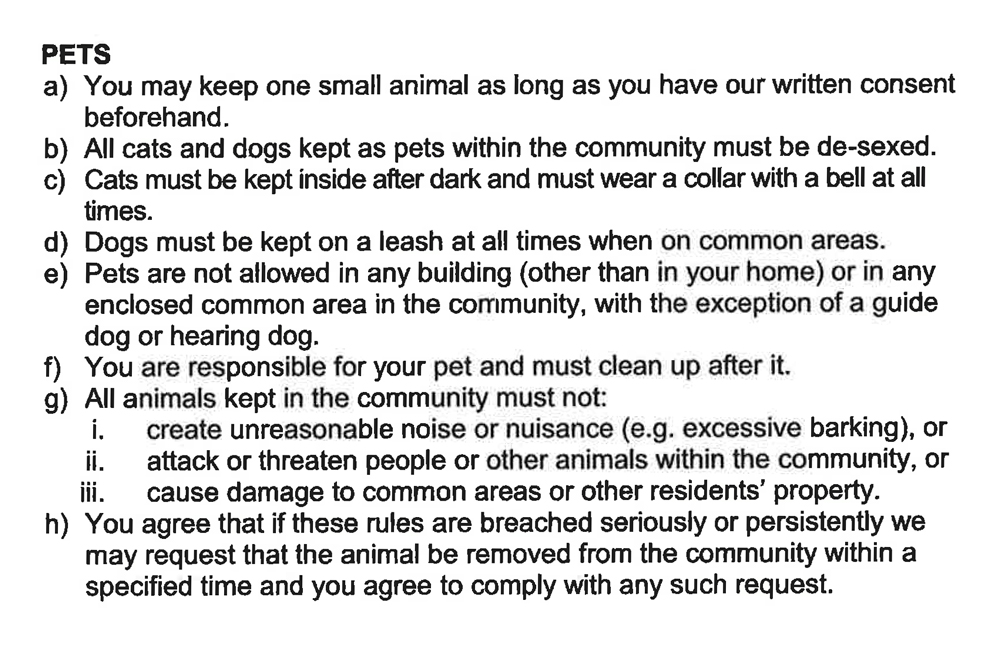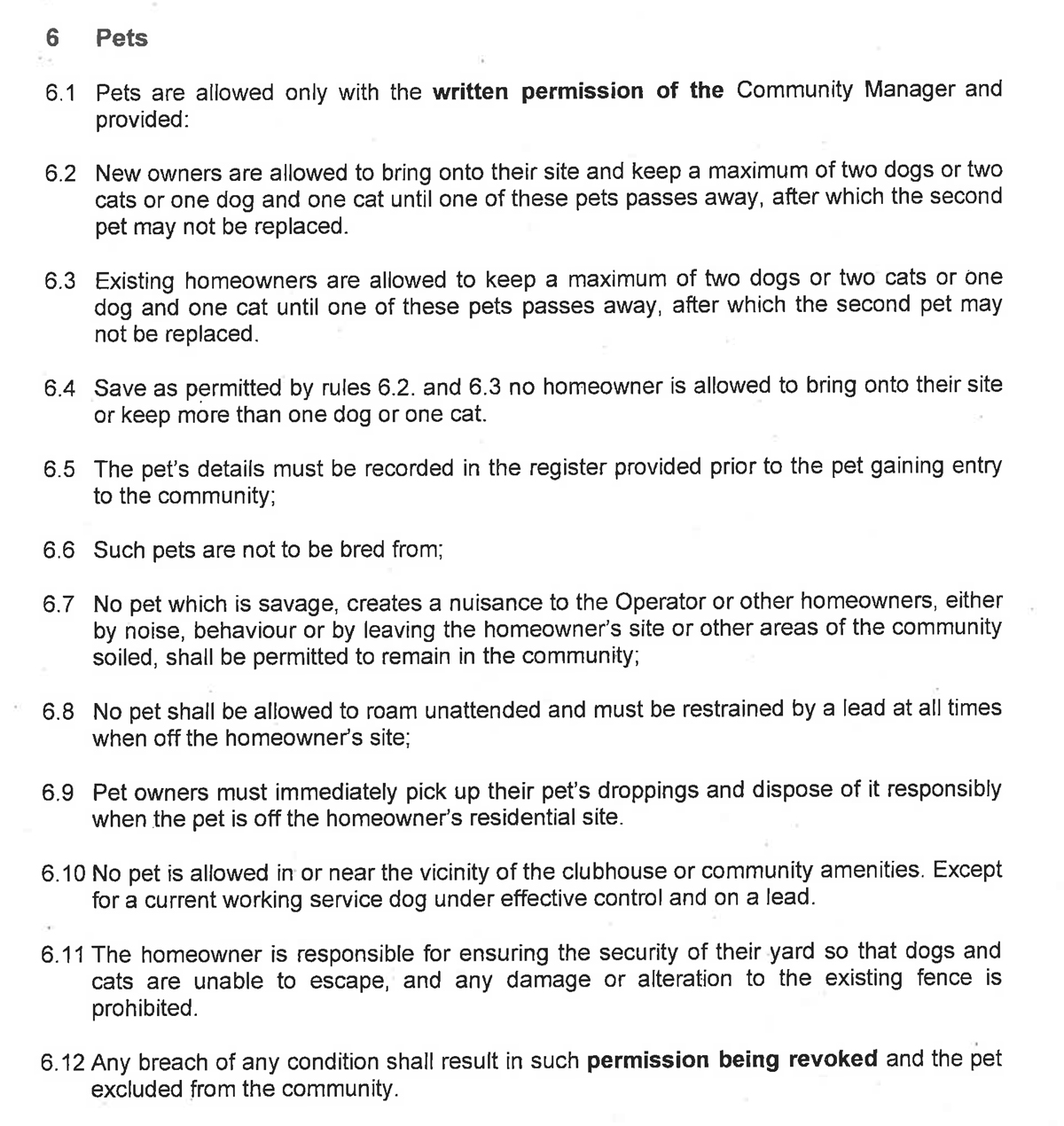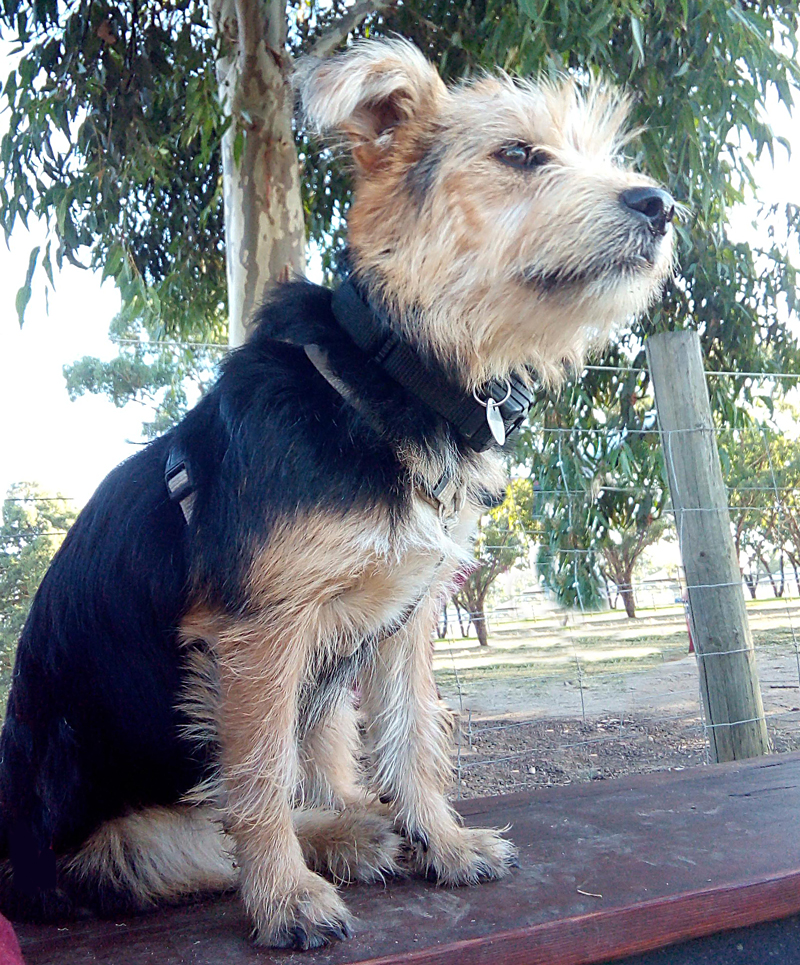Navigating pet ownership in land lease communities
28/11/2023
By Eloise Parrab, Land Lease Communities Officer at the Tenants’ Union of NSW
For many people pets are part of the family. Pet ownership in Australia is among the highest in the world, and keeping pets has been shown to significantly improve physical and mental health and wellbeing. In particular for older people, research has found that keeping a pet can improve quality of life through increased mental and physical health. In 2021, there were almost 30 million pets in Australia, with the average being 3 pets per household.
In recent years there has been a lot of discussion around pet ownership for people living in strata schemes and rental properties in NSW. The NSW Government recently undertook consultation looking at changing the laws around pet ownership for tenants. The NSW Court of Appeal in 2020 found that blanket pet bans in strata were ‘harsh, oppressive and unconscionable.’ This led to changes in the Strata Scheme Management Act in 2021 to allow strata owners to keep an animal unless the animal unreasonably interferes with another resident’s use and enjoyment of a lot or common property.
The Tenants’ Union hears a range of views from residents in land lease communities for and against pets. This article explores some of the issues and potential solutions for how we think the question of pet ownership should be looked at in land lease communities. Like many Australians there are many land lease community residents that would like to have a pet. There are some communities that have a blanket ban on keeping pets and others where there are community rules which provide conditions around the type and number of pets a resident can own. Some communities have a rule that you can bring your pet when you move to the community but you cannot replace a pet after it dies. The Residential (Land Lease) Communities Act (RLLC Act) is silent on pet ownership in land lease communities but the Land Lease Industry Association site agreement has a clause in the additional terms banning pets and this is used by many operators across the state.
Riley Brooke, then Policy and Campaigns Officer at the Tenants’ Union published a blog post on our website in 2022 outlining the case to end blanket pet bans for renters in NSW. The reasons why we think this should happen include:
- Pet ownership in Australia is among the highest in the world
- Animal welfare – refusal to allow pets can make finding a home to rent if you have a pet can be tricky and often means well loved pets end up at animal shelters or abandoned
- Physical and mental health and wellbeing
- Domestic and family violence – lack of pet friendly rentals can be life threatening for people experiencing domestic violence
- Autonomy – arbitrary denial of permission for renters to have pets is indicative of a broader problem: a denial of autonomy to renters
The Tenants Union’s guiding principles when advocating for pet ownership is that households should decide whether they have a pet, with reference to the appropriateness of the dwelling for that animal and any relevant animal welfare or community safety considerations and requirements. This should apply to owner occupiers and renters alike. This would include considering whether the keeping of the pet unreasonably interferes with others’ use and enjoyment of their home or common areas in a building or community. The Strata Scheme Management Act has a list of circumstances that are considered unreasonable interference and we have seen similar lists in community rules of some land lease communities where pets are allowed. The circumstances are:
(a) the animal makes a noise that persistently occurs to the degree that the noise unreasonably interferes with the peace, comfort or convenience of another occupant, or
(b) the animal repeatedly runs at or chases another occupant, a visitor of another occupant or an animal kept by another occupant, or
(c) the animal attacks or otherwise menaces another occupant, a visitor of another occupant or an animal kept by another occupant, or
(d) the animal repeatedly causes damage to common property
Pet ownership may not be suitable in some communities that are located in close proximity to environmental protection zones and where there are genuine concerns about threats posed to native animals. There may also be conditions on a community’s approval to operate from the Local Council that relates to domesticated pets in a community. In addition not all pets are going to be suitable in all communities and there needs to be consideration of whether the type of pet is suited to a residents home and community. The lack of fences in some communities between sites and where homes are close together is a clear factor that needs to be considered when looking at the type of pet that would be suitable. It is important to note that it’s illegal for an operator to refuse a resident keeping an assistance animal, as defined under the Companion Animals Act 1998 (NSW). Assistance animals are specially trained and need to be registered to assist a person with a disability.
Some of the community rules that we have seen relating to pet ownership are very detailed and include rules around what is considered unreasonable interference. Some of the rules are excessive or unnecessary in our opinion – for example we have seen rules that require a resident to pay a fee called a pet bond. We do not agree that a resident should be required to pay any fee to seek permission for a pet on their site.
Pictured: Some examples of community rules relating to pet ownership in RLLCs

Community rules are also a common feature in retirement villages. For residents living in retirement villages a village rule under the Retirement Villages Act 1999 can be challenged on the basis the rule is unjust, unconscionable, harsh or oppressive. Earlier this year a resident in a retirement village took the operator to the Tribunal due to a community rule that prevented keeping of pets (except for fish). The Tribunal was asked to look at whether this rule was unjust, harsh or oppressive as it applied to the resident who had been refused a request to keep two budgies in a cage in his home. The Tribunal found in favour of the resident as they considered that modifying the rule, keeping the birds in their cage and inside the residents apartment, and requiring him to follow the written guidelines of NSW Health would minimise any danger to other residents.

Interestingly the Tribunal noted in the decision the fact that the resident had prior knowledge of this rule before he moved into the village did not make the rule just. See the written decision here
Under the RLLC Act a resident can make an application at the Tribunal disputing whether a community rule on pets is fair and reasonable. It would depend on the circumstances of the resident and the community they live in and the type of pet they would like to own as to whether the blanket rule banning pets or a rule that states a pet cannot be replaced after it dies is (considered) fair and reasonable. The Tenants’ Union is not aware of any recent Tribunal decisions that have looked at this issue.
Geoff (name changed) has lived in two different land lease communities in NSW over the last three years and in both he has come up against a community rule which allows you to bring a pet with you when you move in but you’re not allowed to replace the pet when it dies. Geoff relocated back to Australia from living overseas in 2020 and wanted to bring his little dog with him to live in the community. The operator agreed that he could have his dog in the community once it arrived from Canada. A key reason for Geoff wanting his little dog is that he suffers from anxiety and stress and she was fantastic at providing something positive for him to do each and every day.
To have a being that you are responsible for, and who is a great companion provides great benefits to Geoff for managing the impact of his anxiety and stress related disorders. Unfortunately the cost was too restrictive for Geoff to bring his dog from Canada. Geoff explained to the operator that he would instead look for a suitable little dog in NSW. Geoff provided the operator with letters from his GP and counsellor outlining the benefits of a companion animal to his physical and mental health. The operator said they would talk to him about it further when he found the dog he wanted. Geoff located a suitable dog and due to the high demand for pets had to pick her up the very next day.
When Geoff showed the dog to the operator he was advised that he should have talked to them before he got the dog. Two days later Geoff received a notice of termination from the operator due to breach. Geoff had allegedly breached the community rule concerning replacement of dogs. With the help of a Tenant Advocate Geoff tried to resolve the dispute with the operator. In the end Geoff decided not to take the dispute to the Tribunal as he did not want to stay in a community where the operator did not want him and could make his life difficult. Geoff sold his home and moved out to live in another community. Geoff was able to bring his little dog to live with him in the new community but he knows that when his pet dies he will not be able to replace it.
Pictured: Geoff's dog

Geoff says: “Personally, I find this rule a terrible rule as there is so much evidence available regarding the benefits of having a pet to aged people’s physical and mental well-being. Some elderly go through the situation of losing their husband or wife, then a short time later losing their long-term pet. The negative impact on a person through not only grief but what to do during the day, is substantial. To not allow a replacement pet is, from my perspective, very unreasonable and demonstrates little compassion for fellow human beings.”
At the centre of any debate about pet ownership is the importance of both people and animals having safe homes, and of people having the autonomy to make adult decisions about their home. The impact on neighbours must be taken into account and this will mean there need to be restrictions on both the type of animal and the behaviours and activities around keeping an animal.
At the Tenants’ Union we believe the best way to deal with many of the issues is giving people good guidance and structures through animal welfare laws and council regulations so that they apply to everyone fairly. It is a difficult task of balancing competing interests but we believe that it is possible by applying concepts of fairness and reasonableness. It’s likely that changes are coming, and it’s important that we have reasonable, fair rules for everybody.
This article was published in Outasite magazine issue 10. Outasite is published once or twice annually. Outasite Lite email newsletter is sent several times a year – subscribe here. All past issues are available in the archive.
